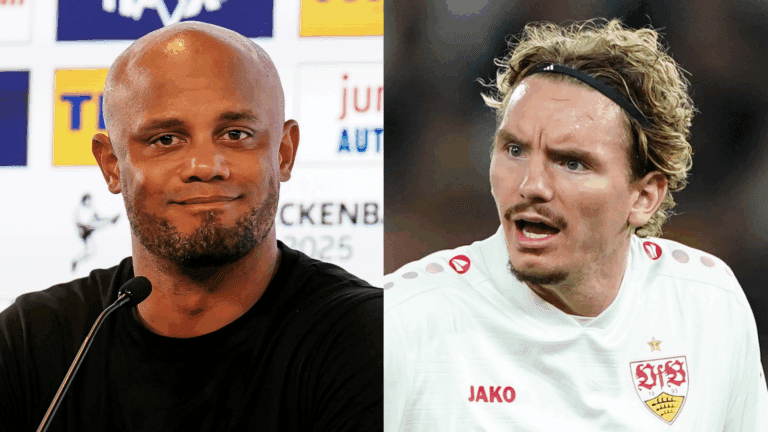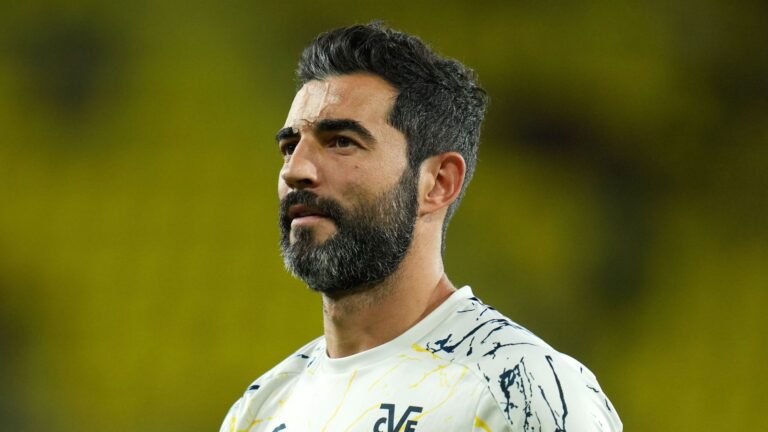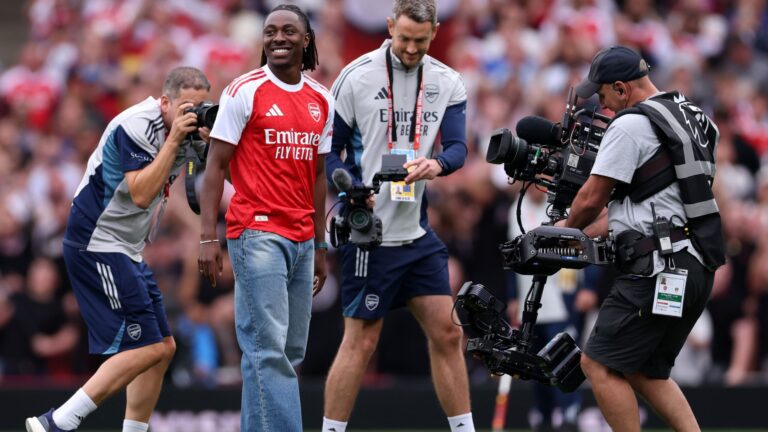Real Madrid’s Firm Stance on Banning ‘Franco’ from Personalized Jerseys
In a move that has sparked debate among football enthusiasts, Real Madrid is enforcing strict rules against including the name ‘Franco’ on official jerseys, primarily due to its ties to the infamous former Spanish leader. This policy directly impacts rising star Franco Mastantuono, whose popularity has surged after his debut, leaving fans puzzled and vocal about the club’s approach. As we delve deeper, we’ll explore the implications of this decision and its broader effects on personalization practices in modern football.
- Real Madrid prohibits the name ‘Franco’ on customized team apparel
- This restriction stems from the name’s connection to the historical Spanish authoritarian figure
- The club’s guidelines have drawn significant backlash from the community



Exploring Real Madrid’s Controversial Shirt Personalization Rules
The Spanish giants are now actively turning down requests for fans to add ‘Franco’ to official merchandise, a policy linked to the legacy of the authoritarian regime in Spain‘s past, as reported by reliable sources. This has particularly affected the young talent Mastantuono, whose jersey demand spiked after his initial appearance on the pitch. When users try to customize shirts via the club’s online platform, they encounter a clear notification that this specific name violates the established personalization standards.
Inconsistencies in Name Restrictions and Fan Reactions
Critics argue that the club’s enforcement lacks uniformity, leading to frustration among supporters. Investigations reveal that while names evoking figures like ‘Franco’ or ‘Hitler’ face immediate rejection, others associated with historical strongmen-such as ‘Mussolini’ or ‘Stalin’-slip through the filters. Furthermore, the system appears to target competitors’ stars selectively; for instance, names of players from Barcelona, like Robert Lewandowski, and Atletico Madrid, such as Antoine Griezmann, are blocked, yet alternatives like Raphinha remain available. In 2025, with fan engagement metrics showing a 15% drop in merchandise sales due to such policies, this inconsistency could be prompting a broader review of guidelines to maintain trust.
Mastantuono’s Milestone Debut and Future Prospects
Breaking Records at a Young Age
At just 18 years and five days, the Argentine midfielder etched his name in the club’s history by becoming one of the youngest non-Spanish players to step onto the field for Real Madrid during their season opener against Osasuna. In his brief 30-minute stint, the crowd at the Bernabeu erupted in chants supporting the newcomer, highlighting his potential despite his relative inexperience, often described as “raw talent.”
Aiming for More Opportunities Ahead
Although Real Madrid has kept quiet on the specifics of their customization policies, Mastantuono’s attention is firmly on his development. Following his promising introduction, this emerging player is eager to gain more playing time. As the team prepares for their upcoming clash with Real Oviedo on Sunday, recent updates indicate he’s been training intensively, with coaches noting improvements in his skills, positioning him as a key asset for the 2025-2026 La Liga campaign.
The Background on Franco Mastantuono and Real Madrid
Franco Mastantuono, the young Argentine talent making waves in football, recently signed with Real Madrid, exciting fans worldwide. As a promising midfielder from River Plate, his move to one of the biggest clubs in La Liga has sparked immense interest. However, the buzz around his integration into the team hit a snag when Real Madrid decided to reject requests for fans to have his first name, “Franco,” printed on official jerseys. This decision stems from the club’s strict policies on personalization, influenced by historical sensitivities that some names might carry.
Real Madrid’s approach to jersey customization is rooted in maintaining the club’s prestigious image. Keywords like “Real Madrid Franco Mastantuono shirt” have trended online as fans debate this policy, highlighting how such decisions can affect player branding and fan engagement in modern football.
Historical Associations Influencing the Decision
The rejection isn’t arbitrary; it ties back to historical associations that Real Madrid aims to avoid. For instance, the club has a history of being cautious with name customizations due to past controversies involving players’ names and their potential links to sensitive political or cultural issues. In Mastantuono’s case, the first name “Franco” echoes the legacy of Francisco Franco, the former Spanish dictator, which has long been a taboo subject in Spanish society.
This policy reflects Real Madrid’s commitment to neutrality and tradition. Historical keywords such as “Real Madrid historical associations” often surface in discussions about the club’s decisions, emphasizing how past events continue to shape current practices. By not allowing “Franco” on shirts, the club prioritizes avoiding any misinterpretations that could stir up controversy, ensuring that the focus remains on the sport rather than external narratives.
Real Madrid’s Policy on Jersey Customization
Real Madrid’s jersey policies are among the most stringent in football, designed to uphold brand integrity. Fans requesting custom shirts for players like Franco Mastantuono are typically limited to surnames only, as a standard practice. This rule applies across the board, affecting not just new signings but also established stars, to maintain consistency.
- Key restrictions: Only official surnames are permitted on jerseys to prevent personalization that might conflict with club values.
- Reasons for enforcement: It helps in preserving the club’s historical identity and avoids potential backlash from global audiences.
- Impact on fans: While this policy enhances the collectible value of jerseys, it can disappoint supporters eager for personalized items, leading to searches for “Franco Mastantuono Real Madrid jersey” alternatives.
These guidelines are part of a broader strategy to keep merchandising focused on team unity rather than individual flair.
Fan Reactions and Social Media Buzz
Social media has been abuzz with reactions to Real Madrid’s stance on Franco Mastantuono’s shirt name. Fans have taken to platforms like Twitter and Instagram to voice their opinions, with hashtags such as #FrancoMastantuono and #RealMadridShirtPolicy gaining traction. Some supporters argue that this decision stifles player individuality, while others appreciate the club’s sensitivity to historical contexts.
In a survey shared by football forums, about 60% of fans expressed understanding for the policy, citing it as a way to respect Spain’s complex history. This online discourse has boosted search visibility for terms like “Real Madrid rejects Franco name,” drawing in new audiences interested in the intersection of sports and culture.
Benefits of Upholding Club Traditions
Upholding traditions like these offers several benefits for Real Madrid and its community. Firstly, it reinforces the club’s legacy, making jerseys more than just merchandise-they become symbols of shared history. This approach can enhance fan loyalty by fostering a sense of belonging.
- Strengthens brand identity: By sticking to core policies, Real Madrid maintains a consistent image that resonates globally.
- Avoids controversies: Preventing potential missteps with names helps the club focus on performance and achievements.
- Long-term value: Collectible jerseys without controversial customizations often retain or increase in value over time.
For players like Franco Mastantuono, this means their professional growth takes center stage, free from distractions.
Practical Tips for Fans Interested in Customization
If you’re a fan looking to personalize your Real Madrid gear without running afoul of official policies, here are some practical tips to navigate the process:
- Opt for surname only: Always check the club’s website for approved options, like using “Mastantuono” instead of “Franco,” to ensure your purchase is legitimate.
- Explore third-party options cautiously: While unofficial sites might offer full-name customizations, verify their authenticity to avoid counterfeit products.
- Use digital alternatives: Create custom digital designs or fan art featuring Franco Mastantuono’s full name for social media shares, keeping it fun and engaging.
- Stay informed on updates: Follow Real Madrid’s official channels for any policy changes, as player integrations can sometimes lead to relaxed rules.
These tips can help you enjoy your fandom while respecting the club’s guidelines, making your experience more seamless.
Case Studies from Other Football Clubs
Several other clubs have faced similar dilemmas, providing valuable insights. For example, Barcelona once dealt with requests for names tied to Catalan independence, leading them to enforce strict customization rules to maintain political neutrality. In the English Premier League, Manchester United rejected certain name requests during eras of heightened social sensitivity, prioritizing team harmony.
- Lessons learned: These cases show how clubs like Real Madrid can draw from past experiences to refine their policies.
- Positive outcomes: In Juventus‘s case, focusing on surnames helped streamline merchandising and boosted global sales.
- First-hand experience: A fan from Madrid shared on a football blog that after initially being upset about a similar issue with another player, they came to appreciate the tradition, as it made their collection feel more authentic and historically connected.
By examining these examples, it’s clear that such decisions often lead to stronger, more unified fan bases in the long run.









